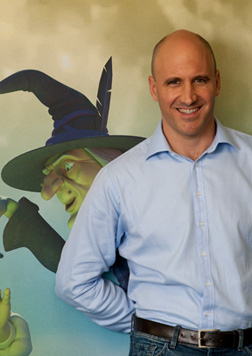Around four years ago, Riccardo Zacconi said he was close to selling King, the arcade gaming company that he had co-founded and bootstrapped six years earlier.
The company, which has a destination site at King.com, had lost about 45 percent of its traffic as one of its biggest partners Yahoo! Games cut back. Facebook, the next big platform King was eyeing, had started to curb the cheap virality that fueled the rise of Zynga.
But after two big pivots onto the Facebook platform and then iOS, King has staged a revival. Today, the company has the #1 grossing game in the U.S. on iOS, and possibly in the world.
The company said this week that it has 50 million daily active players, which is just shy of the 54 million daily actives Zynga reported last quarter. About 49 million of their monthly actives are playing King games on mobile phones and tablets.
“Zynga’s competitive advantage in the past was the size of their network and I think we’ve closed the gap,” Zacconi said.
Because of that big shift, they’re dropping the “.com” from their company’s name. So it’s King, not King.com.
Unlike many competitors that jump on new platforms right away, King has been cautious. The company only started launching mobile titles last fall with Bubble Witch Saga and Candy Crush Saga. They only came to Facebook in early 2011 — when many other companies started putting the platform on the backburner.
Zacconi said that the success of their hit mobile game Candy Crush Saga took him by surprise.
“You read the stats in reports from companies like IDC. But when you experience it, it’s mind-blowing,” he said. Zacconi said his board of directors had approved a budget for 2013 at the end of last year. By the end of January, Candy Crush Saga had done so well that the company had already blown through their December targets.
A little more than 24 million people play the company’s mobile games every day. He says that Candy Crush is played by 1.3 million people a day in Hong Kong. That’s almost 20 percent of the city’s entire population.
The reason the King has been able to be late to market and still do well has to do with the building blocks it has laid out over the last 10 years. King has a portfolio of about 150 games on its destination site, which operates like a lab for titles it can later bring to Facebook and mobile phones.
They test out titles with their “hardcore casual” group of gamers on King.com, who play about five to six hours a day. The games that do well get brought over to other platforms. To date, King has brought seven titles to Facebook and two to mobile. It’s how they help hit-proof their business in a hits-driven industry.
“If some games fail, we needed them to learn and understand what works. It’s really about probability,” he said.
They’re bringing over two more games to Facebook and/or iOS soon: one is called Papa Pear Saga, which is a Pachinko-style game, and another called Farm Heroes Saga that’s a classic Match-3 style game.
King was rumored to be exploring an IPO back in 2011. But the performance of big consumer IPOs like Zynga have made growth-stage gaming companies more reluctant to test the public markets.
“There’s a bright future for us. We’re not planning to be acquired. I don’t know whether we will do an IPO or not,” he said. King raised $45 million back in 2005 from Apax Partners and Index Ventures. Zacconi acknowledged it was largely a secondary round, which he believes was ultimately good for the longer-term health of the company.
“We don’t need to sell, and we can build for the long-term,” he said. He added that he didn’t think that Zynga’s post-IPO performance should have too much a shadow over the industry.
“Savvy investors understand the difference,” he said. “A company is not a sector. Mobile content this year should be a $12 billion market and games is the #1 category by reach and time spent. We are at the heart of this huge tectonic shift.”
